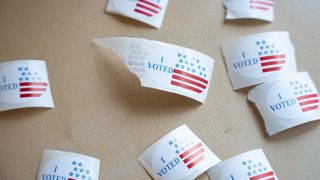Results from the Super Tuesday contests are imminent. Voters in 15 states and American Samoa cast their ballots to nominate their preferred presidential candidate for the Democratic and Republican parties today. Yet, while the number of simultaneous elections is great, the “super” seems to be missing in Super Tuesday.
Typically a high point in the US political primary season, Super Tuesday ordinarily unveils the likely nominees for both parties in a “super” day of voting where about a third of total delegates are decided. In fact, on the Republican side, every winner of the majority of Super Tuesday contest since it became ‘super’ in 1988 has won the party’s nomination at the national convention.
However, this year, even in the open Republican contest, neither of the parties’ frontrunners are facing serious questions about their potential for victory. The race to the nomination and the presidency appears all but certainly to be a rematch between President Biden and former president Trump.
As much as there may not be super results, there are a number of super questions that Super Tuesday poses…
Next steps for Nikki | Nikki Haley, the ‘last woman standing’ between a rematch of Trump v. Biden, has only promised to stay in the race for the Republican nomination until 5 March. Her next steps will become clear after today’s results. Trump appears in a good position to secure the vast majority of the 854 delegates up for grabs today (adding to his total of 273 so far, versus Haley’s 43) due to the winner-take-all system used by most of the 15 states. A strong showing in these states for Trump would make Haley’s pathway to the 1,215-delegate threshold for the Republican nomination almost untenable. So, what does Haley do next? Hang on until July? Endorse the frontrunner? Run as a third-party candidate? Abandon the race? Try again in 2028?
Warning signs for Trump | Trump might have had a commanding lead on Haley and victories in all but one early-voting state, but these victories hide Trump’s weaknesses among constituents that are essential to an eventual victory over Biden in November. Suburban areas, college graduates, ideologically moderate Republicans, independents and those who think the 2020 election was legitimate are particular weak spots for the former president, according to exit polls. Consistently poor performances among these groups on Super Tuesday should prompt the Trump team to try a new strategy or else Trump will repeat the same mistakes – failing to win over college graduates and the suburbs – that contributed significantly to his loss to Biden in 2020.
Alarm bells for Biden | Biden has essentially won every delegate for the Democrat nomination so far and faces no major challenges to the Democratic nomination. Super Tuesday will not create any new variables for the Democratic nomination, but the Republican Party result will affect the president’s campaign strategy for the year ahead.
There is an incumbent advantage for presidents seeking a second term, Biden’s campaign war chest is more full than Trump’s and Democrats’ victories in 2020 and the 2022 midterms showed Trump boosts Democrat turnout. But, the latest New York Times/ Siena poll released over the weekend paints a worrying picture for President Biden in a head-to-head matchup against the former president.
The poll showed that not only does Trump lead 48 per cent to Biden’s 43 per cent for voters’ preferred president but that Biden lacks a consolidated base and enthusiastic support, even among groups where Democrats have typically had advantages. Biden’s edge among working-class voters of colour has diminished from a 50-point margin over Trump in 2020 to now just six points, and 10 per cent of Biden’s 2020 voters have defected and say they will vote Trump in 2024, while no Trump voter intends to vote for Biden.
Rather than Super Tuesday, the State of the Union address on 7 March will be a key moment for the president. He must convince more than 18 per cent that his policies have benefitted the American people personally (40 per cent say Trump’s president has benefitted them personally). He needs to build enthusiastic momentum behind his prospective candidacy for re-election, not just decry the risks posed to democracy by his predecessor. The president needs a convincing message to win the hearts of American voters.
At this critical moment in the presidential election year, Super Tuesday doesn’t look to be a close race, but the general election certainly does.






